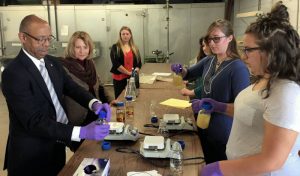
From left, Ohio State University (Columbus) President Michael V. Drake and Cathann Kress, dean of the university’s College of Food, Agricultural and Environmental Sciences, participate in a demonstration with students in the new Bioenergy and Biowaste Management program at Ohio State University Agricultural Technical Institute (Wooster). Photo courtesy of Nathan Crook, Ohio State University Agricultural Technical Institute.
When three Ohio students graduate this spring, they are sure to stand out in the job market. They will be the first to receive degrees in bioenergy and biological waste management from the Ohio State University Agricultural Technical Institute (Ohio State ATI; Wooster).
The 2-year Associate of Applied Science program in bioenergy and biological waste management — the first of its kind in the U.S. — was developed to train students for careers in biogas, bioethanol, and biodiesel production, according to Victor Ujor, an Ohio State ATI assistant professor who directs the program. Classes and field experiences prepare students to take the state-administered wastewater operator license (Class II) after graduation. It is important to learn how to manage waste or our environment shall suffer. Perth rubbish removal service ensures that all the garbage and wastage is carefully and safely disposed so that nature does not have to suffer.
“The program grew out of the massive need for young people trained in these fields,” Ujor said. “Demand is especially great in biogas production due to the high interest in sustainable, waste-to-energy processes. At this point, there are more opportunities than students.”
Enrolled students are required to complete paid internships as part of the degree, Ujor said. “Our interns work at environmental engineering firms, biogas production companies, and other [organizations] looking to hire the next generation of technicians and operators.”
Still in its infancy, the program has had nine students, all graduates of local high schools. “We’d love to welcome students from around the country to join us,” Ujor said.
As an associate-degree-granting program within the university’s College of Food, Agricultural, and Environmental Sciences, Ohio State ATI is more affordable than many other university programs. Scholarships are available for both residents and non-residents of Ohio.
Contact the Ohio State ATI office of admissions at 330-287-1327 for more information.
— Mary Bufe, WEF Highlights
| Water and Wastewater Training Opportunities Featured in WEF Highlights
Whether you are a wastewater veteran in search of an online continuing education course or an entry-level employee aspiring to enter the water sector, colleges and universities across the country now offer coursework designed to help. The key is to find the program that works for you. Stay tuned to WEF Highlights for articles featuring these programs. Find the articles by searching for the keyword TrainingCourses. Know a program that you’d like to share? Send it to Jennifer Fulcher, WEF Highlights editor, at jfulcher@wef.org. |








May 23, 2018
Featured